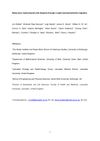1 citations,
November 2011 in “British journal of pharmacology” Enzymes are classified into six types and are essential for many biological processes, with only a few targeted by drugs.
February 2024 in “International journal of molecular sciences” Type 3 Innate Lymphoid Cells help maintain skin health and balance, and are involved in skin diseases and healing.
 January 2022 in “Sustainable development goals series”
January 2022 in “Sustainable development goals series” The document concludes that significant investment in agricultural innovation is necessary to achieve global food security and nutrition.
87 citations,
December 2015 in “Cochrane library” No single treatment is clearly effective for central serous chorioretinopathy.
63 citations,
February 2017 in “ACS biomaterials science & engineering” Polydopamine is a safe, effective, and permanent hair dye that turns gray hair black in one hour.
56 citations,
September 2010 in “Veterinary pathology” Certain mouse strains develop a skin condition similar to a human hair loss disease due to genetic defects.
 29 citations,
November 2022 in “Nature Medicine”
29 citations,
November 2022 in “Nature Medicine” Genetic variations greatly affect individual metabolism and can impact health and disease risk.
24 citations,
December 2018 in “Inflammation and Regeneration” Phospholipase A2 enzymes play key roles in skin health and disease.
21 citations,
June 2009 in “Mammalian genome” A new mutation in the Hr gene causes hair loss in mice, similar to a human hair disorder.
 19 citations,
December 2021 in “Endocrine Reviews”
19 citations,
December 2021 in “Endocrine Reviews” There are various effective hormone treatments for puberty induction in boys and girls with hypogonadism, and starting treatment early is important.
14 citations,
December 2021 in “International journal of molecular sciences” Growth hormone levels affect hair growth and loss, with too much causing excess hair and too little leading to hair loss.
7 citations,
March 2022 in “International Journal of Molecular Sciences” FGF21 can help reduce skin inflammation caused by C. acnes.
 6 citations,
December 2023 in “Lancet. Infectious diseases/The Lancet. Infectious diseases”
6 citations,
December 2023 in “Lancet. Infectious diseases/The Lancet. Infectious diseases” SIM01 significantly reduced post-COVID symptoms and is safe.
 4 citations,
July 2023 in “Pharmaceutics (Basel)”
4 citations,
July 2023 in “Pharmaceutics (Basel)” Nanoparticle-based drug delivery to hair follicles is more effective when tested under conditions that match skin behavior.
 4 citations,
October 2022 in “Genes”
4 citations,
October 2022 in “Genes” Our microbiome may affect the development of the hair loss condition Alopecia Areata, but more research is needed to understand this relationship.
3 citations,
November 2021 in “Clinical, Cosmetic and Investigational Dermatology” Autologous cellular micrografts improve hair density and thickness in the short term for androgenetic alopecia.
 November 2024 in “Applied Sciences”
November 2024 in “Applied Sciences” Placenta products might help with hair loss, but more research is needed.
 August 2024 in “Frontiers in Nutrition”
August 2024 in “Frontiers in Nutrition” Antioxidant-rich diets may reduce hair loss risk, while pro-inflammatory diets may increase it, especially in women.
April 2024 in “Surgical Techniques Development” The 11th AICPE Congress in Rimini was a major event in European aesthetic plastic surgery.
January 2024 in “International journal of molecular sciences” A brain-made hormone can protect against memory-related brain damage caused by harmful proteins.
 January 2024 in “Endocrine and metabolic science”
January 2024 in “Endocrine and metabolic science” Different types of PCOS need specific diagnosis methods and treatments.
 December 2023 in “The journal of physical chemistry. B (1997 : Online)”
December 2023 in “The journal of physical chemistry. B (1997 : Online)” Human hair keratin might be good for filtering out harmful substances from water.

Nanocarriers with plant extracts show promise for safe and effective hair growth treatment.
 49 citations,
April 2016 in “International journal of molecular sciences”
49 citations,
April 2016 in “International journal of molecular sciences” Shift nurses show altered body temperature and stress hormone levels, suggesting their body clocks adjust to irregular schedules.
 15 citations,
October 2012 in “Journal of circadian rhythms”
15 citations,
October 2012 in “Journal of circadian rhythms” RNA from horse hair follicles can track circadian rhythms non-invasively.
103 citations,
December 2021 in “Journal of biological rhythms” Shift work disrupts the body's natural clock, leading to health problems.
 61 citations,
September 2010 in “Genomics”
61 citations,
September 2010 in “Genomics” The study found that immune responses disrupt hair growth cycles, causing hair loss in alopecia areata.
 24 citations,
January 2015 in “Annals of Dermatology”
24 citations,
January 2015 in “Annals of Dermatology” Herbal extracts may help hair grow and could be an alternative to synthetic hair loss treatments.
 14 citations,
January 2006 in “Skin pharmacology and physiology”
14 citations,
January 2006 in “Skin pharmacology and physiology” Procyanidin compounds from apples and barley promote hair growth and prevent hair cell death.
 January 2023 in “bioRxiv (Cold Spring Harbor Laboratory)”
January 2023 in “bioRxiv (Cold Spring Harbor Laboratory)” Newly born mesenchymal cells quickly spread out in response to tissue tension during early development.
















